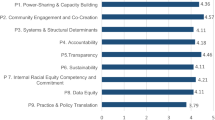Abstract
There is a consensus about the benefits of community-based participatory research and the important role it can play in reducing cancer health disparities. Although every community-based participatory research project is unique in many ways, several fundamental issues deserve consideration. We discuss issues concerning community representation, possible tensions within community-based participatory research (CBPR) projects, and staffing CBPR projects. Flexibility, open-mindedness, transparency, and above all, caring, are characteristics that best ensure successful and rewarding outcomes.
Similar content being viewed by others
References
Haynes M, Smedley B (1999) The unequal burden of cancer committee on cancer research among minorities and the medically underserved. Institute of Medicine, National Academy Press, Washington
American Cancer Society (2013) Cancer facts & figures for African Americans 2013–2014. American Cancer Society, Atlanta
Smith BD, Smith GL, Hurria A, Hortobagyi GN, Buchholz TA (2009) Future of cancer incidence in the United States: burdens upon an aging, changing nation. J Clin Oncol 27:2758–2765
McCracken JL, Friedman DB, Brandt HM et al (2013) Findings from the community health intervention program in South Carolina: implications for reducing cancer-related health disparities. J Cancer Educ 28:412–419
Wallerstein NB, Duran B (2006) Using community-based participatory research to address health disparities. Health Promot Pract 7:312–323
Seifer SD, Michaels M, Collins S (2010) Applying community-based participatory research principles and approaches in clinical trials: forging a new model for cancer clinical research. Prog Comm Health Partnerships Res Educ Action 4:37–46
Simonds VW, Wallerstein N, Duran B, Villegas M (2013) Community-based participatory research: its role in future cancer research and public health practice. Prev Chronic Dis 10:e78
Greiner KA, Friedman DB, Adams SA et al (2014) Effective recruitment strategies and community-based participatory research: community networks program centers’ recruitment in cancer prevention studies. Cancer Epidemiol Biomarkers Prev 23:416–423
Meade CD, Menard JM, Luque JS, Martinez-Tyson D, Gwede CK (2011) Creating community–academic partnerships for cancer disparities research and health promotion. Health Promot Pract 12:456–462
Hatch J, Moss N, Saran A, Presley-Cantrell L, Mallory C (1993) Community research: partnership in black communities. Am J Prev Med 9(Suppl):27–31
Hughes-Halbert C, Weathers B, Delmoor E (2006) Developing an academic-community partnership for research in prostate cancer. J Cancer Educ 21:99–103
Thompson B, Hébert JR (2014) Involving disparate populations in clinical trials and biobanking protocols: experiences from the Community Network Program Centers. Cancer Epidemiol Biomarkers Prev 23:370–373
Minkler M, Wallerstein M (2003) Community based participatory research for health. Jossey-Bass, San Francisco
Israel BA, Eng E, Schulz AJ, Parker EA (eds) (2005) Methods in community-based participatory research for health. Jossey-Bass, San Francisco
Green LW, Mercer SL (2001) Can public health researchers and agencies reconcile the push from funding bodies and the pull from communities? Am J Public Health 91:1926–1929
Minkler M (2005) Community-based research partnerships: challenges and opportunities. J Urban Health 82(Supplement 2):ii3–ii12
Green LW (2001) From research to “best practices” in other settings and populations. Am J Health Behav 25:165–178
Marmot M (2004) The status syndrome: how social standing affects our health and longevity. Henry Holt and Company, New York
Luque JS, Rivers BM, Kambon M, Brookins R, Green BL, Meade CD (2010) Barbers against prostate cancer: a feasibility study for training barbers to deliver prostate cancer education in an urban African American community. J Cancer Educ 25:96–100
Author information
Authors and Affiliations
Corresponding author
Rights and permissions
About this article
Cite this article
Lian, B., Kohler, C.L. & Ross, L. On Some Practical Considerations Regarding Community-Based Participatory Research for Addressing Cancer Health Disparities. J Canc Educ 31, 207–211 (2016). https://doi.org/10.1007/s13187-014-0782-z
Published:
Issue Date:
DOI: https://doi.org/10.1007/s13187-014-0782-z




